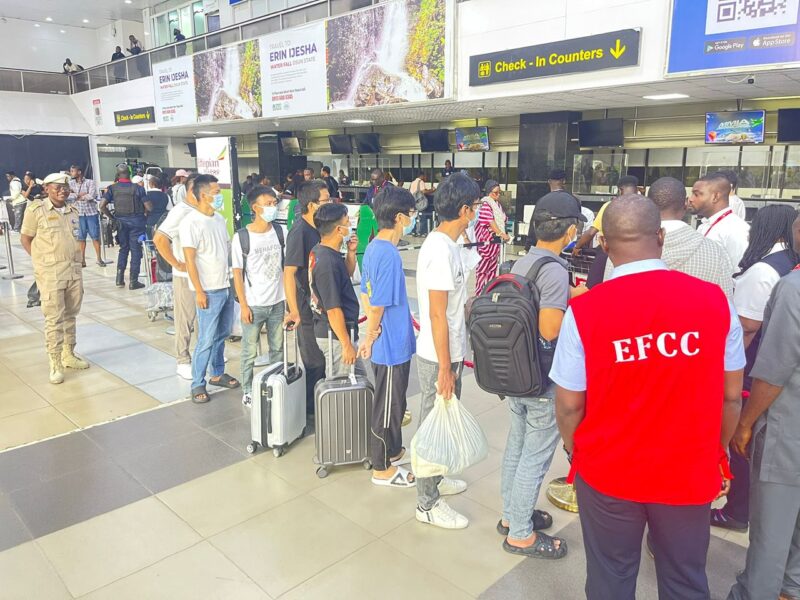From Juliana Taiwo-Obalonye, Abuja
The Civil Society Legislative Advocacy Centre (CISLAC) has applauded the Economic and Financial Crimes Commission (EFCC) for a landmark operation that exposed and apprehended a large foreign-led cybercrime network in Lagos, shaking up the global narrative around internet fraud often linked solely to Nigerians.
On Tuesday, December 10, 2024, the EFCC raided a seven-storey building in Victoria Island, Lagos, arresting 792 suspects, the majority of whom were foreign nationals allegedly involved in a sophisticated cryptocurrency investment and romance scam syndicate. The suspects include 148 Chinese, 40 Filipinos, two from Kharzartan, one Pakistani, and one Indonesian.
According to the EFCC, the syndicate recruited and trained Nigerian youths to act as local operatives, using their identities as fronts for the crimes masterminded abroad.
In a statement, CISLAC’s Executive Director, Auwal Musa Rafsanjani, praised the EFCC’s professionalism and tenacity, saying the arrest “underscores the Commission’s dedication to tackling cybercrime at the highest level and proves that these crimes are often orchestrated by international actors who exploit vulnerable Nigerians for their schemes.”
Rafsanjani stated that this operation challenges damaging stereotypes. “What we are seeing is a transnational criminal hierarchy where foreign masterminds manipulate and discard Nigerian youth after using them to front illegal operations,” he said. He warned that such harmful narratives have long tarnished Nigeria’s reputation and obscured foreign criminals hiding behind local proxies.
Highlighting the modus operandi, Rafsanjani explained, “These syndicates prey on unemployed or desperate young people by offering fake job opportunities and financial incentives, only to expose them to criminal risk while remaining in the shadows.”
CISLAC called for a thorough and transparent investigation to ensure all involved, regardless of nationality, are held accountable. It urged the Nigerian government to boost youth-focused programmes, digital security measures, and cyber-literacy initiatives to reduce vulnerability to recruitment by criminal networks.
“The fight against cybercrime cannot be won in isolation,” CISLAC stated, calling for stronger collaboration among key agencies, including the EFCC, Nigeria Immigration Service, and Nigeria Customs Service. The organisation noted that foreign criminals exploit immigration control weaknesses to operate illegally within Nigeria.
Enhanced immigration screening and proactive enforcement are crucial, CISLAC said, to prevent foreign criminals from embedding within local communities. It also spotlighted the Nigeria Customs Service’s role in intercepting illegal arms, equipment, and contraband that facilitate organised crime—calling for strengthened border surveillance and inter-agency intelligence sharing.
The group additionally recommended deeper engagement with international partners, multilateral institutions, and credible civil society organisations, which can provide vital intelligence, data, and technical support to bolster investigations and prosecutions.
Beyond law enforcement, CISLAC emphasised the role of media and public awareness in tackling the social dimensions of cybercrime. It raised concern over rising numbers of Nigerian students abandoning education to chase quick money through online scams.
“The media must play a proactive role in reshaping public perception and educating young Nigerians on the long-term dangers of cybercrime,” the organisation said, calling for nationwide awareness campaigns and youth empowerment programmes as critical prevention tools.
CISLAC concluded by reaffirming its support for the EFCC and other agencies working to restore Nigeria’s international image. The organisation stressed the urgent need for a unified national strategy addressing cybercrime’s root causes, fostering lawful opportunities for youth, and ensuring accountability at all criminal levels.








